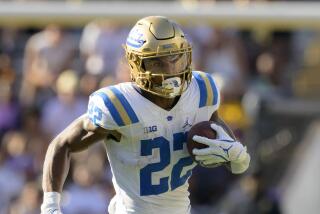UCLA’s Moore Has Never Been Short on Flair for Scoring Goals
Joe-Max Moore has spent much of his soccer career ambushed by his own biology. At 20, he still looks like a hesitant hall monitor. He is barely tall enough to qualify for the rides at Disneyland. His frame gives the impression that Moore has made a habit of leaving the table before anyone offered seconds.
He is a reminder that stature is not always defined by size but also by worth. He has persevered beyond what well-meaning others told him were physical limitations. It is significant that he has blossomed in soccer--sport’s egalitarian game, a refuge for the small but quick, the lithe and the wiry.
Moore has outlasted his detractors, establishing a career in international amateur soccer and as an anchor on the UCLA team that won the NCAA championships last season. A midfielder, he is the Bruins’ leading goal scorer this season, with 18.
The team is only one victory away from returning to the championship tournament. UCLA (18-3) will play host to Santa Clara (18-1-1) in the West Regional championship match Sunday at 1 p.m. at UCLA’s north soccer field.
Moore’s recent goals have displayed a flair for the dramatic. He scored the second one during Sunday’s 3-0 victory over Portland, and how he scored it impressed all who saw it.
UCLA Coach Sigi Schmid had alerted his team at halftime that Portland goalkeeper Kasey Keller was playing the goal to the front and center. He was vulnerable in the corners.
Moore tested this observation during the second half. He stood near the end line, about 30 yards from the goal, and sent a cross to the area in front of the net. Only this shot began to curl until it traced a wide arc into the net. It was much like kicking a field goal from the intersection of the goal line and the sideline.
Players and coaches from both sides were talking about the shot. Keller called it the best cross he had ever seen. Portland Coach Clive Charles, who was a star in the English First Division, saw the shot for what it was, saying: “He’s never going to hit that one again, not in his lifetime.”
Moore said he rises to the challenge of never as it applies to his athletic career. “I’ve been hearing that a long time,” he said. “People have been telling me I’m too small all my life. “
With good reason. Durng his freshman year at Mission Viejo High, Moore was 5 feet and 105 pounds. He began growing after his junior year and by the next season was the CIF offensive player of the year.
Moore is now 5-8, 150, and one of the Bruins’ most skilled players. When he learned he would not be able to play through opponents, Moore developed dribbling skills that allowed him to play around them.
It is his shooting that defines Moore, whose accuracy is the result of hard work.
“I probably practice my shooting more than anything,” he said. “I work on all kinds of shots during practice. I like taking free kicks. You get a chance to show something.”
It was Moore’s free kick that set up a dramatic scenario when the upstart U.S. team played Mexico in the gold medal match of last summer’s Pan American Games in Cuba. Mexico, an amateur soccer powerhouse heavily favored to win, was clearly the crowd favorite on a blustery August night in Havana.
The match quickly became contentious after Mexico scored first in the 16th minute. The Mexican team appeared to be stimulated by the Cuban crowd’s singing and chanting on their behalf; the Mexican players grew more physical and aggressive. The smaller and less experienced U.S. team was quickly overmatched.
Only when a Mexican defender fell down did the United States score late in the first half. The scorer, Claudio Reyna, soon left the game after suffering an ankle injury on a hard tackle. Reyna was replaced by Moore.
Neither team was able to score during the second half. The game went into overtime, with the players exhausted from the heat, humidity and intensity of the game. It was in overtime that Moore, the lowly substitute, stepped into the spotlight.
Manny Lagos of the U.S. team was fouled, and Moore took the free kick from about 20 yards out. The Mexicans set up a wall in front of Moore, who had already told his teammates he was going to try to put the ball in the net instead of passing it. Moore’s kick lofted over the wall of Mexican defenders and, tipped by the right hand of the goalkeeper, tucked into the upper corner of the net.
Moore’s heroics gave the United States only its fourth victory over Mexico since the teams began playing in 1934. But it was more than that. Moore’s shot was one small goal for the U.S. team, and a giant score for the little guys, wherever they are.
More to Read
Go beyond the scoreboard
Get the latest on L.A.'s teams in the daily Sports Report newsletter.
You may occasionally receive promotional content from the Los Angeles Times.







